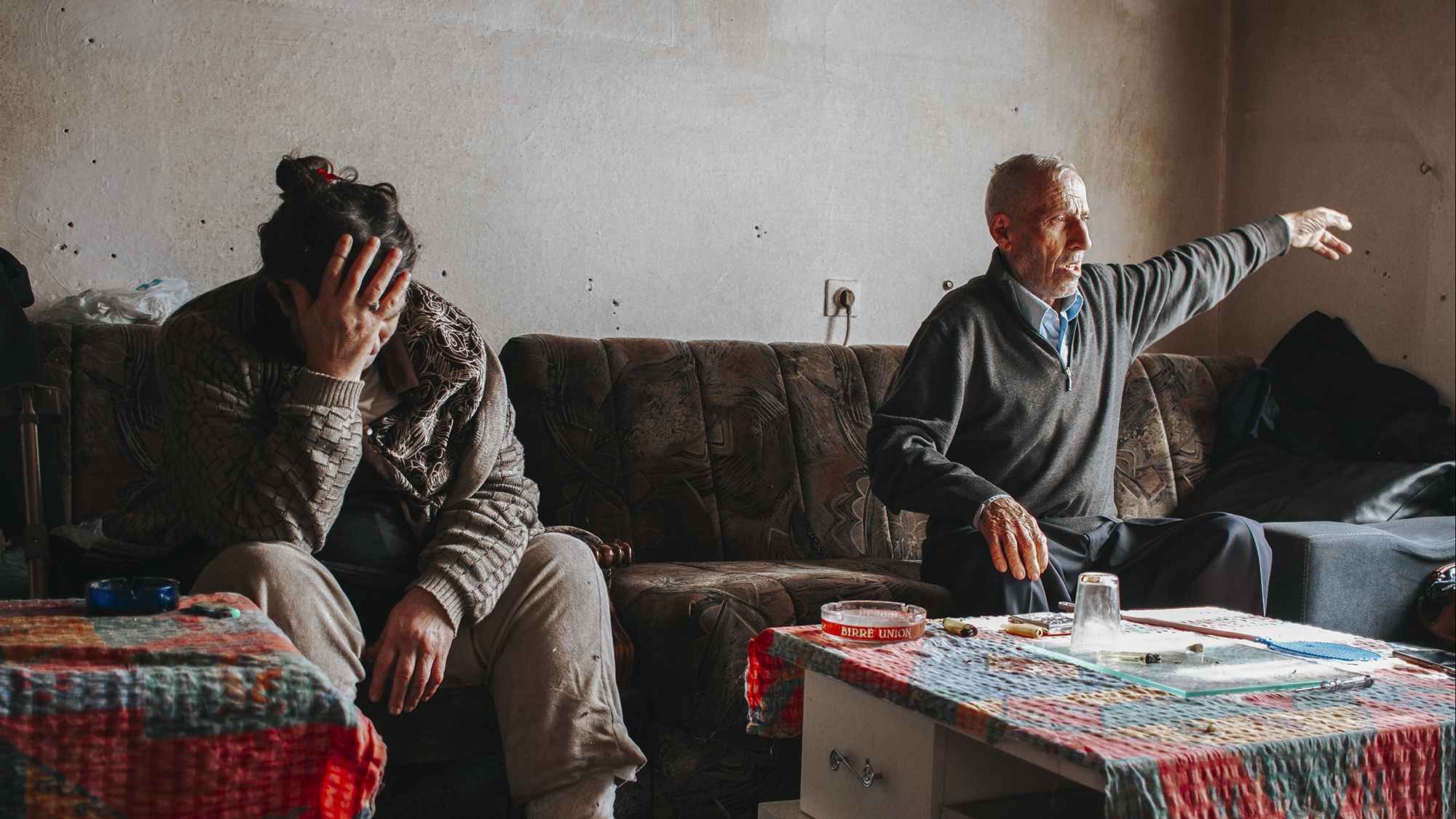
Invisible in old age
Poverty and institutional neglect isolate Kosovo’s elderly.
70-year-old Behxhet Igrishta uses the beads which hang around his neck as tasbih or prayer beads. He prays with them every morning and evening to have some bread to eat in his old room in a small house at the end of an alley in Obiliq.
Although his son lives on the second floor of the same house, Igrishta lives alone. He calls his room in the corner of the first floor of the house “disastrous.” The room is full of old unused things, including a TV. “It doesn’t work,” he said, “except for one channel.” Ingrishta expressed his worries and blamed successive governments for not increasing the pension.
His monthly pension of 100 euros is not enough to cover his expenses. “I swear to God, I barely have bread to eat during the day,” he said, adding that when his son does not bring him food, often all he eats in a day is a boiled egg or bread dipped in warm oil. He doesn’t remember the last time he bought new clothes. He wears an old striped T-shirt but doesn’t recall who gave it to him many years ago.
With wrinkled hands, he tends to his small yard, strewn with old clothes and damaged boards. He doesn’t complain about the work; he likes to take care of his yard but also wants to be able to go out with his friends in Obiliq or Prishtina. However, poverty has isolated him to the point that he cannot even pass his old age alongside his peers.
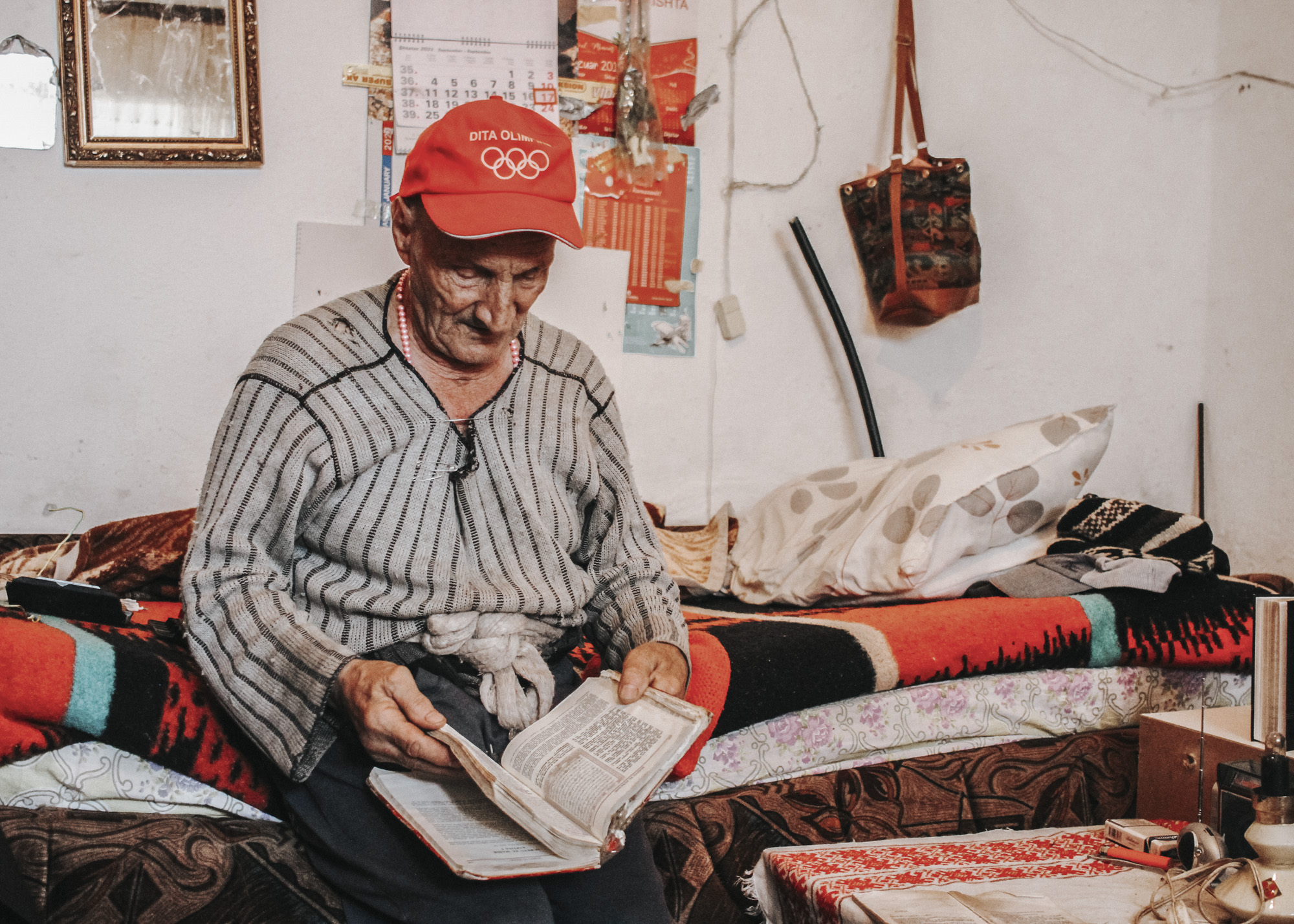
“I always wanted to reach my old age in good circumstances, to have someone that looks after me. I always thought about going to Germany and I still do. But there is no one there to take me, [though] at least I would have a better pension,” said Igrishta.
Until before the war in Kosovo, Igrishta worked for over 20 years in the coal mine in Aleksinac, Nišava District. While carrying coal, Igrishta cut one of his fingers and injured his chin, leaving a scar that is still visible on his face. Since he cannot prove the work experience required to receive a higher pension, he only receives the basic pension of 100 euros. He believes that, at the very least, he deserves a pension that recognizes his dignity, so he does not have to live out his old age in poverty.
Around 150,000 other pensioners over 65 also only receive a basic pension of 100 euros. Igrishta is one of 70,000 pensioners who were left with a 100 euro pension due to a lack of documents or an inability to prove the necessary years of work experience before 1999. This proof is required to qualify for the contributory pension of between 182 and 265 euros.
Although 100 euros is insufficient to cover basic expenses such as food, medicine and fulfilling the needs of old age, the existing pension scheme has strained and destabilized the state budget. Over the years, attempts and promises to reform the pension system have failed.
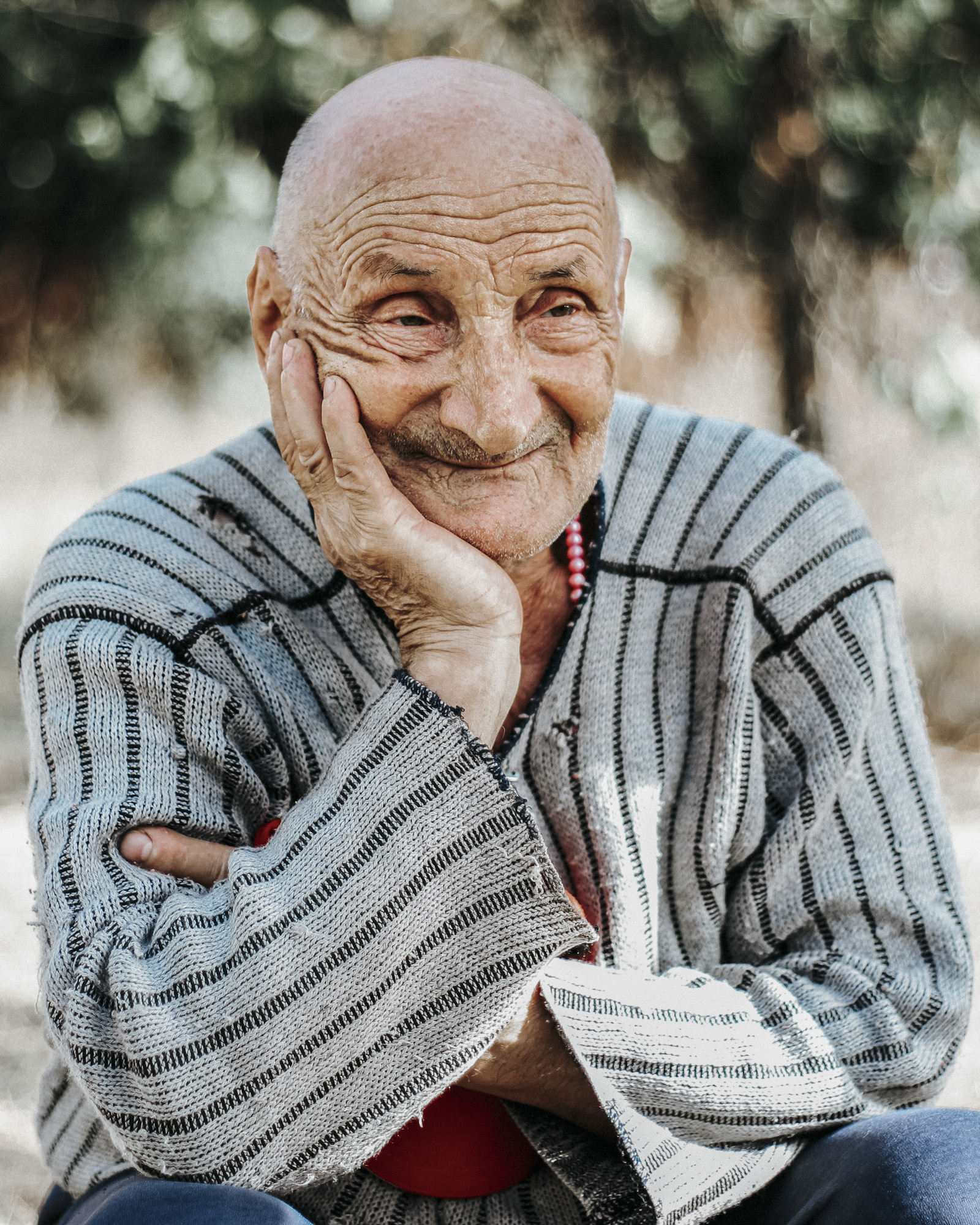
“What to do with 100 euros?”
Kosovo’s pension system is almost two decades old. After the breakup of Yugoslavia, Kosovo built a system centered on universal basic pensions and defined contributions. During the Yugoslav period, Kosovo participated in the Yugoslav pension system, which operated according to a solidarity system between generations, also known as a pay-as-you-go pension system.
Under this scheme, workers, such as Igrishta, contributed to the pension fund from their monthly salary, which was used to pay current pensioners. When workers retired, their pensions would be funded by current workers in the labor market. This meant that the state budget did not have the financial burden of covering pensions.
In 1989 when Serbia revoked Kosovo’s autonomy and started imposing violent measures, many Albanian employees were fired from their jobs. After the war, Kosovo remained without a pension system and the pension contributions from workers, such as Igrishta, were lost. Additionally, thousands of documents proving work experience were lost, which would have ensured many a higher old-age pension.
From 1999 to 2002, the United Nations Mission in Kosovo (UNMIK), acting as Kosovo’s temporary administrator, launched a social assistance program. This program provided monthly amounts of 25 euros to several categories based on their needs, including those over the age of 65. This program served as a starting point for the pension system, with contributions from several international organizations, such as the International Labor Organization (ILO). The ILO is a United Nations agency that aims to achieve economic and social justice by establishing international labor standards.
The new system was based on three pillars. The first pillar comprises a basic old-age pension, which is accessible to citizens of Kosovo over 65 years old. This type of pension serves as a universal social benefit to protect those over 65 from poverty, regardless of work experience. This pillar included a disability support pension, a monthly stipend for Kosovo citizens between the ages of 18 and 65 years old who can prove that they are not able to work. This pillar is financed from the state budget.
The second pillar is the mandatory pension, where all residents of Kosovo contribute 5% of gross salary and employers contribute another 5%. The third pillar foresees supplementary or voluntary pension contributions. Pensioners that have made these contributions receive payments from these two pillars as an additional amount on top of the basic pension.
After starting at 25 euros in 2002, the basic pension has increased over the years to 50, 70, 95 and 100 euros. Despite this last increase, purchasing power decreased in 2021 due to global inflation, which has affected the cost of electricity, food, medicine — the basic needs of the elderly.
A pension of 100 euros is insufficient for 80-year-old Fetije Peci, who lives alone in Vushtrri.
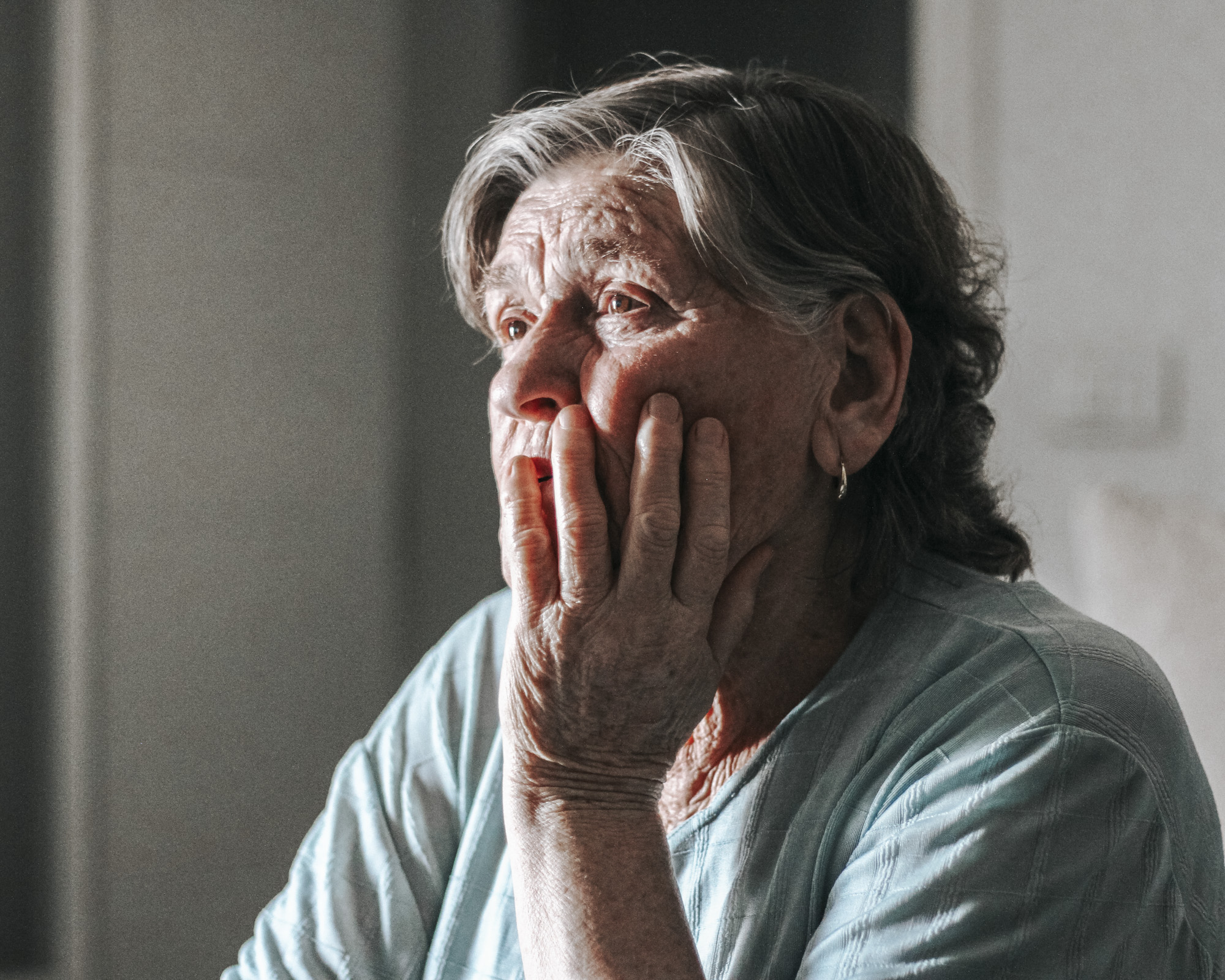
“What to do with 100 euros? You can only fill up a plastic bag. Nothing else,” she remarked, as she walked through the streets of Vushtrri to buy bread.
For seven years she has lived in a small apartment that she bought after the sale of the house in which she lived with her husband. With only a monthly pension of 100 euros, she could not afford to furnish the apartment herself, but she ultimately managed to do so with the help of donations. However, the apartment still lacks basic items like a stove, a fridge and a vacuum cleaner. Peci’s apartment was cold in the middle of September, even though the weather was unusually warm.
With her old hands, which have spent a lifetime cooking and sewing children’s dresses, she flicks a red lighter and ignites the small green gas stove to make two Turkish coffees. In the corner of the room stands a broken electric stove. Apart from these stoves, there is nothing else to heat her home. “If you hear that an apartment in Vushtrri burned down in the winter and an old woman was burned, I’m telling you it’s going to be me,” said Peci, fearing that in the winter she will have no way to keep warm. The previous winters she passed being wrapped in a blanket and sometimes with a small heater.
“For me, 200 euros is more than enough. During the winter it gets worse because I don’t have a heater. Anyone who comes here asks me how I can stay in this cold, but I’m always wrapped in a blanket,” she said.
Four months ago, she injured her leg and back in a traffic accident. The amount of medication she needs has increased, along with her concerns about how much more money she will need to buy all her medication. Peci picked up her medication, worth about 30 euros, from the pharmacy near her apartment. Since she could not afford to pay the whole sum at once, she paid the pharmacy back in installments over three months. In the last month of repaying the debt, Peci did not buy any yarn. She saved 13 euros from her pension to add to her savings to pay the last 16 euros of the debt. She doesn’t even have five euros left out of her 100 euro pension, as she divides it to pay for electricity, the elevator, water, food and medicine.
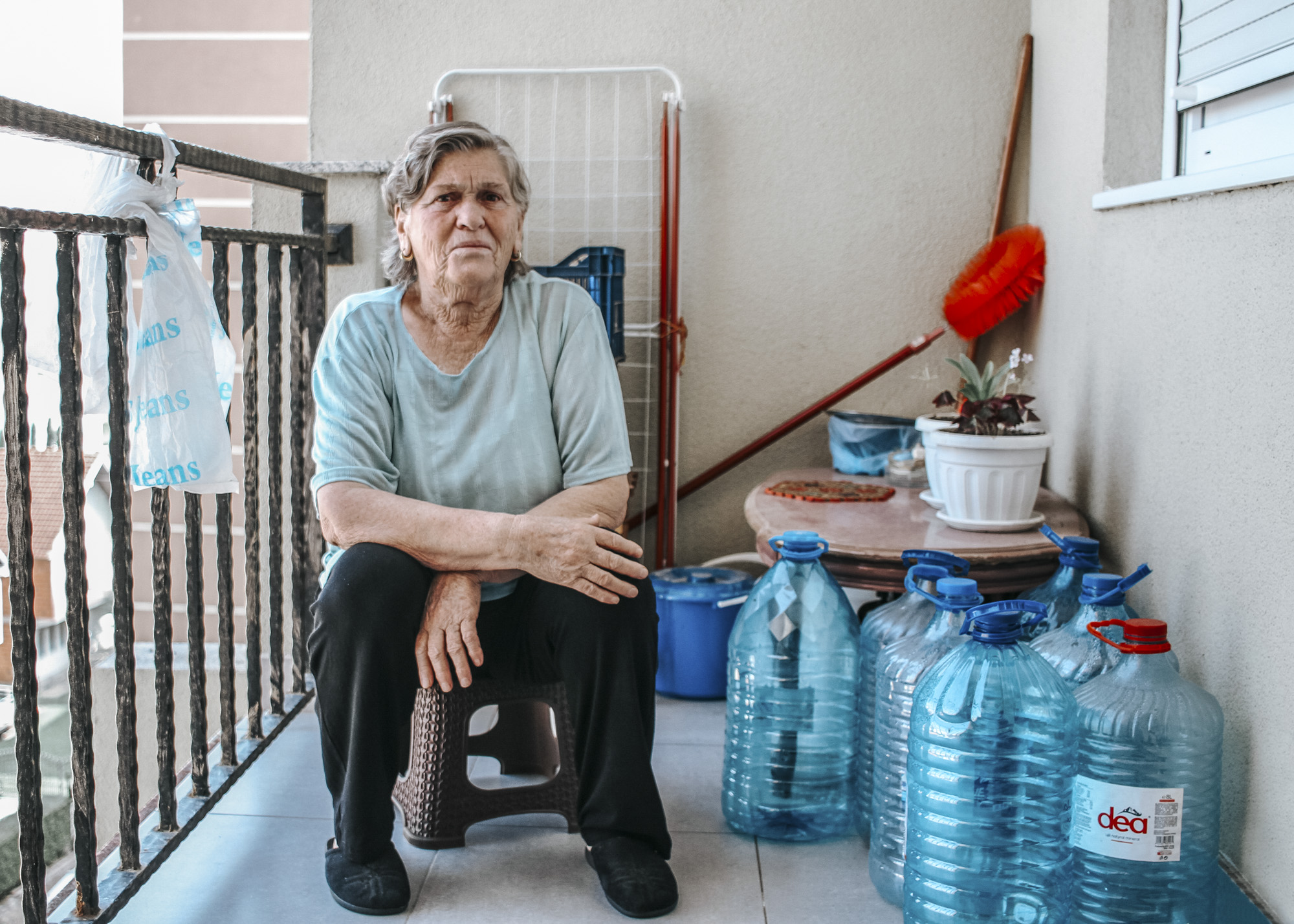
The pension system in Kosovo lacks a proportional connection between the standard of living and the pension provided. The pension is supposed to reflect the inflation rate and increase accordingly. This ensures that the basic pension is sufficient to cover monthly expenses. The latter serves to estimate how much the basic products cost, so that an individual can make it through the month. According to data from 2017, which does not take into account the high inflation rates in 2021 and 2022, the monthly shopping basket of a Kosovo citizen was 125 euros, while pensioners only started to receive 100 euros earlier this year.
In a response to K2.0, the World Bank (WB) said that Kosovo’s pension system still lacks a consistent and coordinated approach to basic pension indexation. According to the WB, this can reduce the adequacy of the basic pension and lead to increased poverty among the elderly. For a stable pension system, the WB said, it is important that the Government of Kosovo takes care of the regular indexation of basic pensions, following determinable and direct models. This would ensure the elderly are protected from poverty and strengthen the stability of the national budget.
“When I miss eating something in particular, my friends invite me over. When you get used to not eating, you just get used to being without it, you don’t even miss anymore,” said Peci, who never has the chance to buy something for her own pleasure, but usually spends her meals eating peppers that she prepares on the gas stove. “I never buy something I miss and I like to eat, no, I forget that I want to buy it, only this bread, water and tea that I drink each day. I’m used to it now,” she said.
Peci worked as a cook for 15 years in the Mitrovica-based social enterprise Ushqimi Shoqnor before the war in Kosovo. Like Igrishta, she has not been able to prove her work experience to receive an additional pension. She is still trying to find documents in the Archives of Mitrovica that prove her employment history, but most of them were burned during the war.
Neglected by institutions
89-year-old Ferizi Ramadani and 61-year-old Mehremja Ramadani sat inside a visibly moldy room in Kolovica, Prishtina, visibly exhausted. It was 2:33 p.m. and they still had not eaten. During the 40 minutes they watched a Turkish television series, they did not stop crying. Both survive on only 100 euros from Ferizi’s pension. “Honestly, people help us because otherwise we would be dead from hunger. This pension is not nearly enough to cover the expenses of our medication,” said Ferizi.
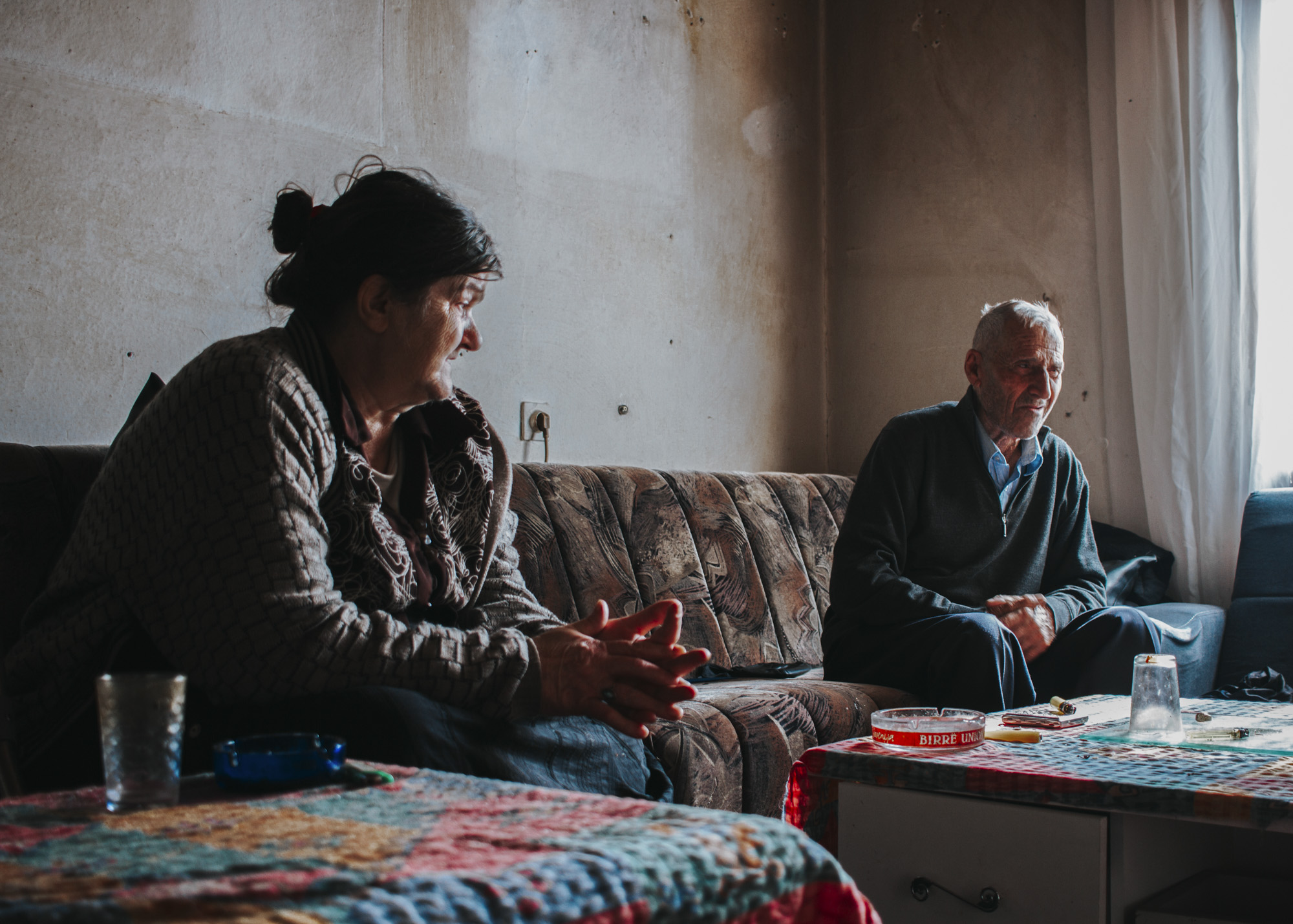
Mehremja’s medication costs about 50 euros. She has not been out in the yard for two years due to complications from diabetes, which has made it difficult for her to walk. As Mehremja does not receive a pension, she and Ferizi split the 100 euros from Ferizi’s pension to pay for her insulin and their late afternoon soup. The bed in the living room where she sleeps is covered in wet rags used to refresh the soles of her feet.
In the past 10 years, they have moved three times and now rent a one-room house. Since they receive no assistance apart from the pension, Mehremja has at-home medical check-ups by humanitarian organizations such as the Red Cross.
Before retiring, Ferizi worked as a security guard in warehouses around Prishtina. However, he does not have any documents to prove his work experience because he worked without a contract, so he cannot receive more than the basic pension. His five children do not live with him, so the only help he receives for basic needs is from donations.
“One day, I entered a place to eat and a young man, whom I did not know told me ‘uncle, sit down here and eat whatever you want.’ We drank two teas together. And, honestly, he said ‘how much does your wife’s medication cost?’ He gave me money for the bus fare. He also gave me 100 euros and I don’t know who he is,” said Ferizi.
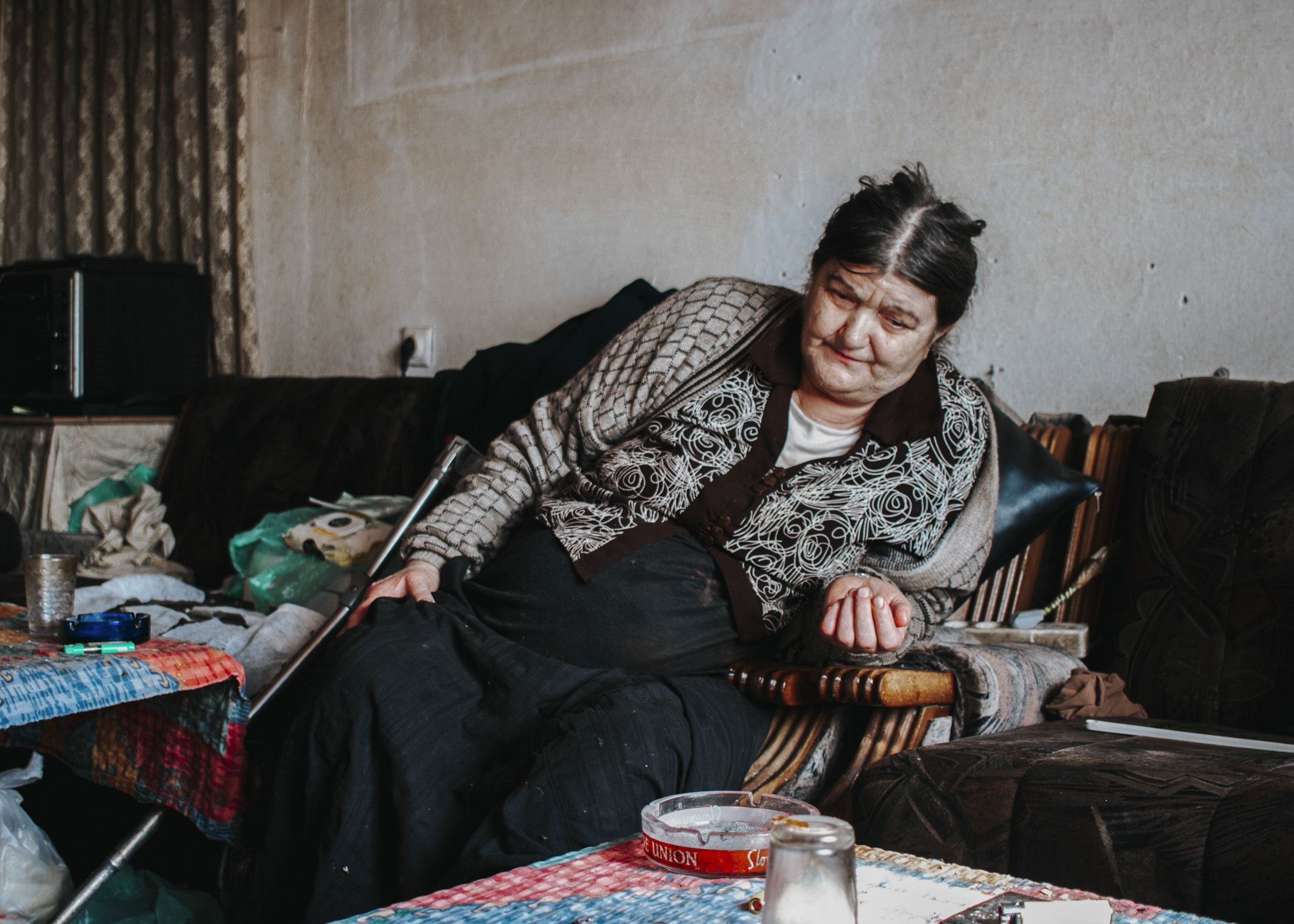
The Ramadani couple would gladly have lived in an old people’s home, if a humanitarian organization paid for it or the government made it possible. Their condition is so severe that they can no longer even take care of each other. Although Ferizi tries his best to take care of his wife who cannot go outside, old age has made him weary.
In Kosovo, there are four nursing homes financed by the state budget. There are also 25 private nursing homes, according to a 2018 report by the Kosovo Initiative for Stability, an independent research institute. This is not enough to meet the demand.
There is also a lack of dedicated places where pensioners can socialize or partake in activities exclusively for them. Other than a few places to play a game of chess, there are limited options.
Social policies to make the elderly more active in society are missing. Social protection from the state only extends to the financial assistance that pensioners receive at the end of the month, which they have to spend on essentials. Socializing has become a luxury for them.
According to sociologist and researcher Artan Mustafa, understanding the socialization of the elderly means considering more than the lack of dedicated spaces for them. It also involves considering the impact of low pensions, inefficiency and lack of solidarity in pension financing. Additionally, insufficient investment in public health care and the development of public amenities such as parks and sports facilities contributes to this issue.
When analyzing this poorly structured pension system and social policies for the elderly, Mustafa emphasized that a pension of 100 euros is insufficient. He blames this on neoliberal ideology, which has led to social policies that prioritize protection from only extreme poverty and the sustainability of public finances.
According to Mustafa, this system was not properly designed and “does not prioritize other legitimate goals, such as life satisfaction, longevity, interpersonal trust and towards institutions, quality of life, activity and socialization.”
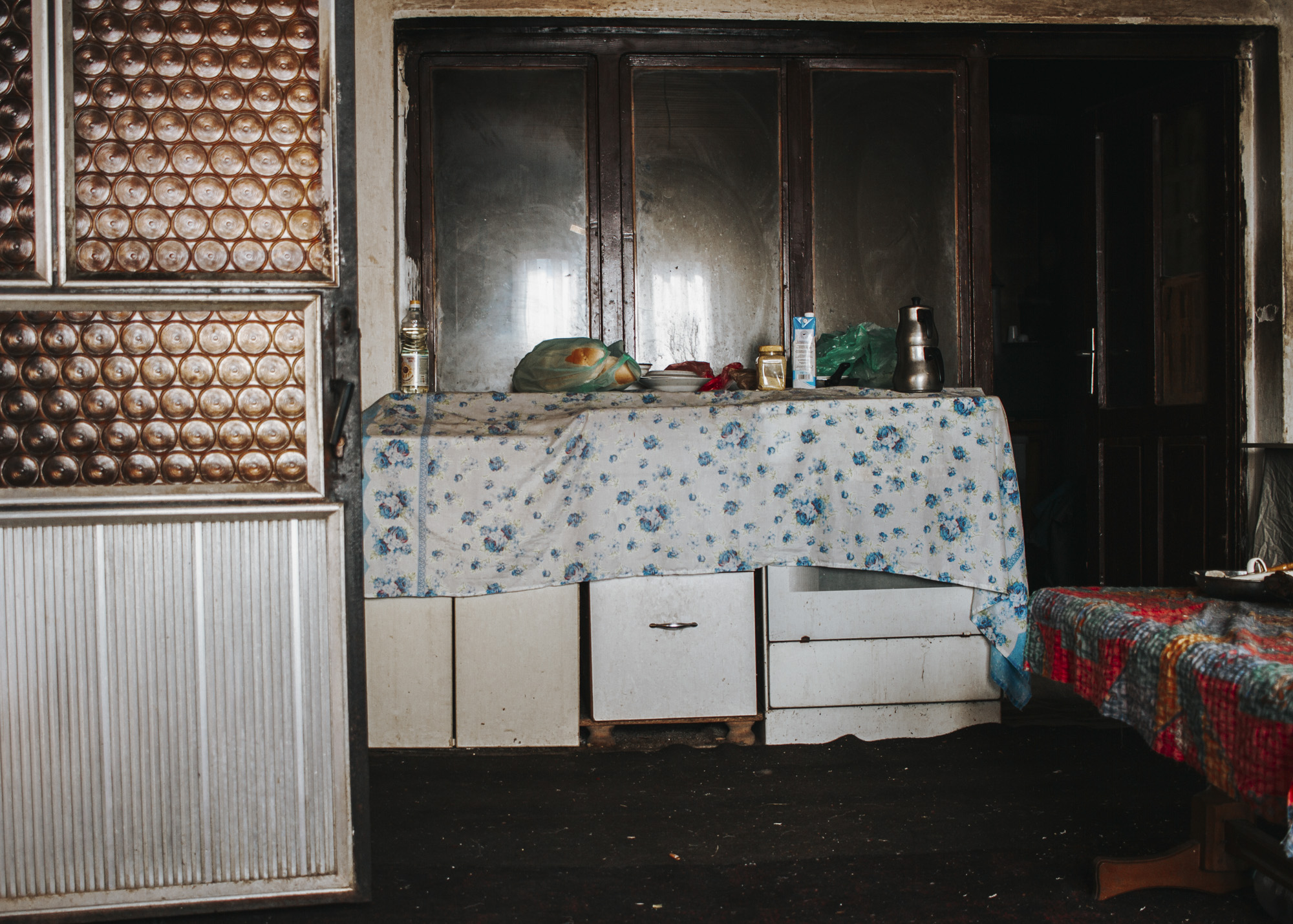
The fact that 75% of the elderly receive a low monthly pension undermines the pensions’ ability to effectively reduce poverty among the oldest population. In this sense, Mustafa said that pension income in Kosovo has the lowest capacity in the Western Balkans to reduce poverty.
Kosovo’s basic pension is the only one in the EU, U.K. and Western Balkans that is not accompanied by other benefits that facilitate the lives of the elderly and make their lives more active.
In 2017, the percentage of people aged 75 or older who spend at least three hours a week in physical activity peaked at 71.8% in Estonia. According to a Eurostat report, there are five other European Union (EU) member states where more than half of this age group spent at least three hours a week doing physical activities: Denmark, Germany, the Netherlands, Slovakia and Sweden.
In 2015, around 15.5% of the EU adult population met with friends on a daily basis, while 9.3% of EU elderly aged 75 or over did not manage to see their friends in the 12 months before the survey was carried out.
Kosovo is not part of the EU and so did not participate in this survey. However, during this time there was no progression in the policies for Kosovar pensioners.
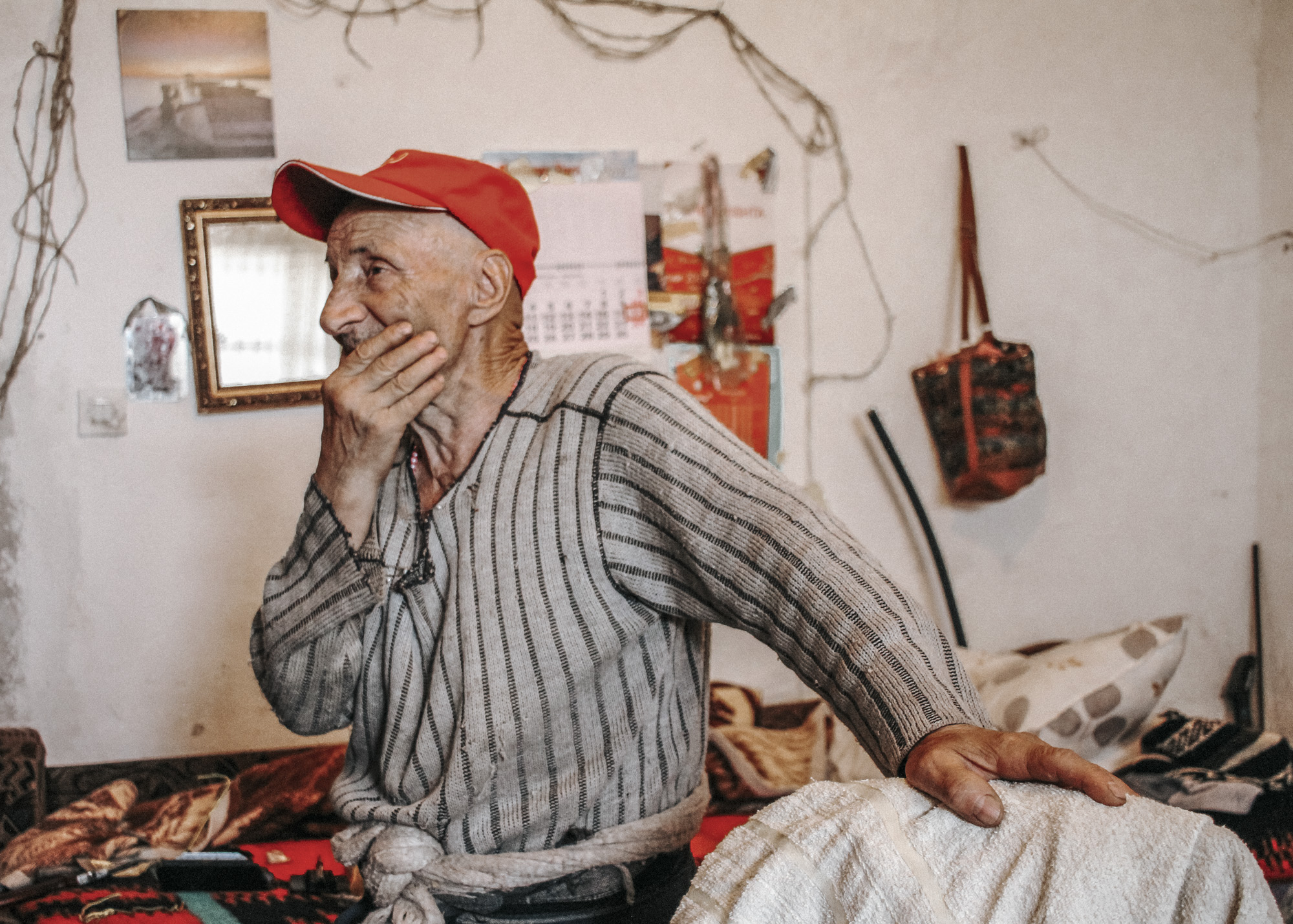
Besides the increase in the basic pension to 100 euros, the only other change occurred on July 6, 2023 when the Government of Kosovo made amendments to the Law on Pension Schemes. The Kosovo Assembly approved the Law on Pension Schemes in 2014. Under this Law, citizens who were 65 years old and could prove that they had 15 full years of work experience before 1999 became entitled to receive a contributory pension of between 180 to 265 euros, depending on their educational qualifications. Those who had 14 years and 364 days of work experience were not eligible for this pension and only received the basic amount of 100 euros.
The amendment of the Law on July 6 this year enabled workers who do not have 15 years of work experience due to being fired in the 1990s to receive the contributory pension. The Constitutional Court found that the article that allowed this discriminated against about 74,000 pensioners.
Nevertheless, this amendment places an additional burden on the state budget, which was 3.5 billion euros in 2023. 600 million euros per year, or 17% of the annual state budget, is allocated to cover the expenses of pension schemes.
Pension expert Selatin Kllokoqi, a researcher at Democracy Plus, highlighted the pressing need for reform. He said that radical change would enable everyone to get “what they deserve.” He emphasized that the greatest injustice is done to contributors from before the war, who all contributed to the country they lived in in one form or another, even under the umbrella of Yugoslavia.
He demands that the radical reform addresses and clarifies the pension system as a whole, especially in relation to pension schemes.
In 2002, the first pillar consisted of only two schemes: the old-age pension and the disability pension. By 2023, 10 more schemes had been added, such as the pension for the blind and the pension for war veterans.
“They are just heading toward a dead end, because it’s an ad hoc system. At a certain moment, for different reasons, everyone has invented a scheme to fulfill the desire of a certain group of retirees, maybe for a good reason, maybe just for votes,” said Kllokoqi. “But at the end of the day, we have a system that no one understands and [from which] more than 300 million euros are paid out.”
According to a report by the Kosovo Agency of Statistics (KAS), from January to July 2023, Kosovo spent over 305 million euros in financial support for retirees and for those who belong to various social schemes. The most money was spent on payments to people who have retired, about 106 million euros.
Pensions account for the largest share of social protection spending in the Western Balkans, but low productivity and employment, together with aging populations and emigration, threaten the financial sustainability of these systems according to a 2023 WB report.
According to Kllokoqi, while the consequences of the 1990s have influenced the consolidation of the pension system, this should not be seen as a justification for the prolonged failure of state institutions to find a solution.
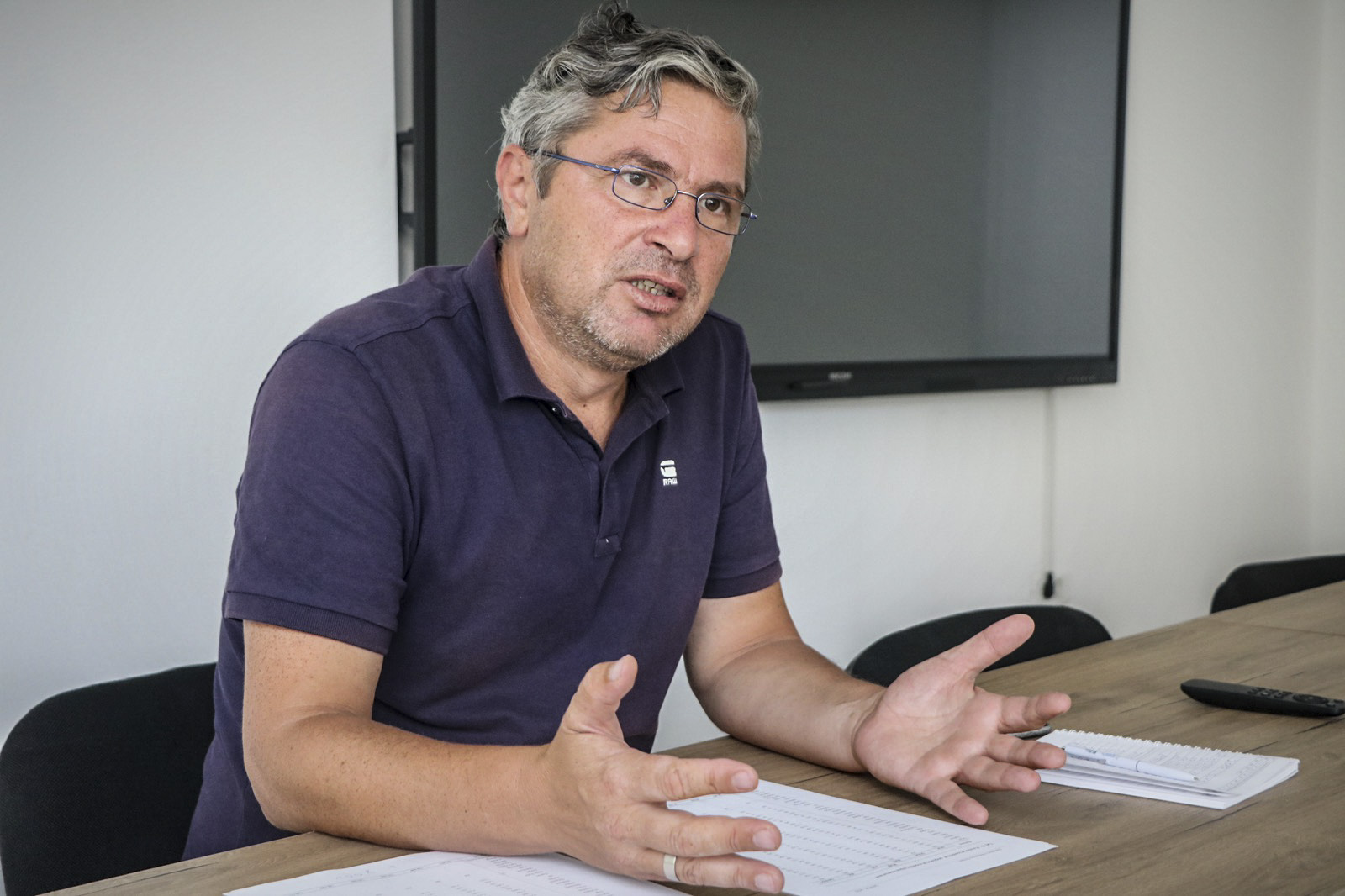
Over the years, documents have been prepared by the relevant ministries aimed at reforming the pension system, but none has been approved.
Two concept documents, one drafted by the Ministry of Labor and Social Welfare (MLSW) now merged into the Ministry of Finance, Labor and Transfers (MFLT) in 2018 and the other by the ad hoc Parliamentary Commission, established in 2019 for pension reform, have remained in the drawer due to the change of successive governments or the rejection of concept documents by relevant institutions.
The MLSW’s concept document foresaw a reform of the pension scheme by establishing the Social Security Fund (SSF). With this change, first pillar pensions would be managed by the SSF and not by direct funding from the state budget. The purpose of this document is to increase social solidarity, since workers would receive their contributory pension throughout their retirement and not until the savings in the second pillar run out and they are left with the basic pension.
The Parliamentary Commission’s concept document foresees the formation of the SSF, with Kosovo’s social protection structured around four pillars. It anticipates a funding model similar to European countries, drawing from a combination of four sources — the state budget, social security, savings and market-based insurance.
The reform proposed in the concept document would save around 150 to 250 million euros annually by 2032. Currently, the state budget spends from 631 to 730 million euros, while the reform would reduce the expenses to about 482 million euros.
According to Blerim Hasani, Director of Pensions at the MFLT, the MFLT will propose the next increase during this year to include in next year’s budget.
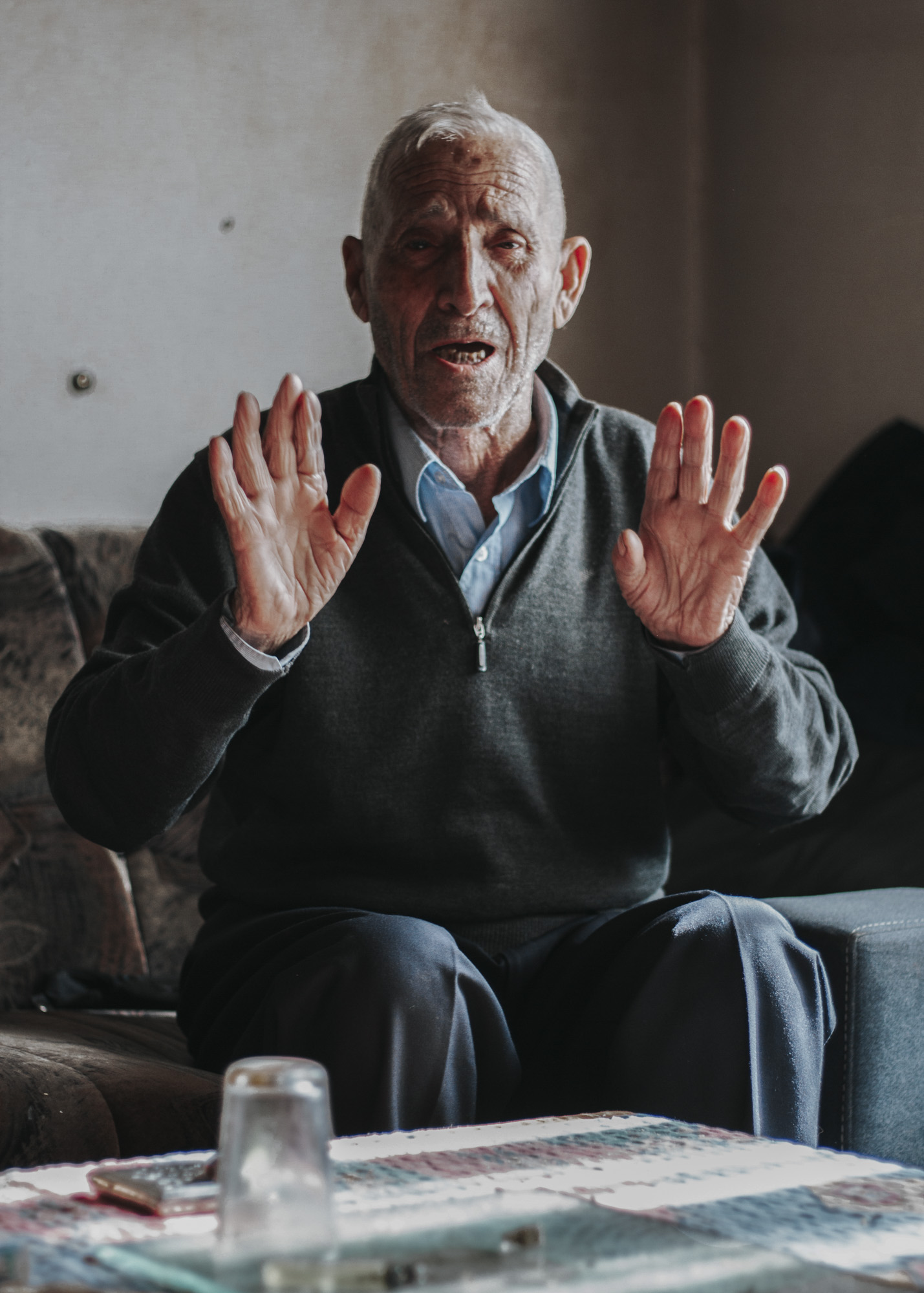
However, Kllokoqi, based on his field research, said that it is not logical for the 100 euro pension to increase if minimum wage stays the same, even if the pension is insufficient. According to him, there needs to be economic development to enable the pension and the standard of living to increase.
“How can you give 200 euros to someone who has never worked, when someone who works eight hours and cares for a child earns a salary of 130 euros?” said Kllokoqi. “We cannot artificially increase the standard, because the general standard increases with work, with economic development.” According to Kllokoqi, if the old-age pension is increased by just 20 euros, it would cost the state budget around 36 million euros more.
The 100 euro pension stands at about 20% of the average salary in Kosovo, which is similar to the level of the minimum pension or minimum social benefit guaranteed in EU countries and Western Balkan countries. This amount increases in line with minimum wage. According to KAS data, the average salary in Kosovo is 521 euros.
Minimum wage has been part of the public debate and electoral promises of various parties over the years. Since its initial establishment in 2011, the minimum wage of 130 to 170 euros continues to be the lowest in Europe.
One of the reasons why it has not increased until now is that in previous years’ draft laws, the minimum wage was also linked to the pensions received by about 60,000 war veterans. If the minimum wage were to increase, the budget expenses would also increase to cover the pensions of this category. The WB had repeatedly opposed this connection.
On July 13 of this year, the draft law was approved in the second reading, which foresees the increase of the minimum wage to 264 euros gross. However, the draft law did not include provisions for an automatic increase in war veterans’ pensions. This omission led to several protests by the veterans in front of the government. The opposition party, Alliance for the Future of Kosovo, sent the draft law to the Constitutional Court.
However, it is unclear how the increase in the minimum wage will affect the increase in pensions since all previous increases in pensions have been ad hoc, without any direct connection to the minimum wage.
Ad hoc measures were also implemented in the form of temporary economic packages by the Kosovar Government in 2021 and 2022 in response to the worsening economic situation caused by the COVID-19 pandemic and subsequent inflation.
Besides the pension increase to 100 euros, pensioners benefited three times from an additional 100 euros during this period. But these packages only provided temporary help.
According to Suzana Gashi, director of the Department for Legal Affairs and the Department for Protection from Discrimination at the Office of the Ombudsperson, an average stable form of assistance would be more appropriate, “because the way [these packages] were distributed meant their effect was not noticed.”
According to Gashi, although pension increases and pensions themselves are human rights issues, they are ultimately contingent on budgetary constraints.
WB experts have drawn attention to the fact that, compared to other European countries, the share of public expenditure on pensions in Kosovo relative to Gross Domestic Product (GDP) is relatively low (about 7%, 2% of which is for pension schemes specifically for consequences of the war). However, despite this comparison, such a level of spending constitutes a significant part of the budget, bringing potential fiscal risk. The GDP growth rate for the second quarter of 2023 is 2.02%.
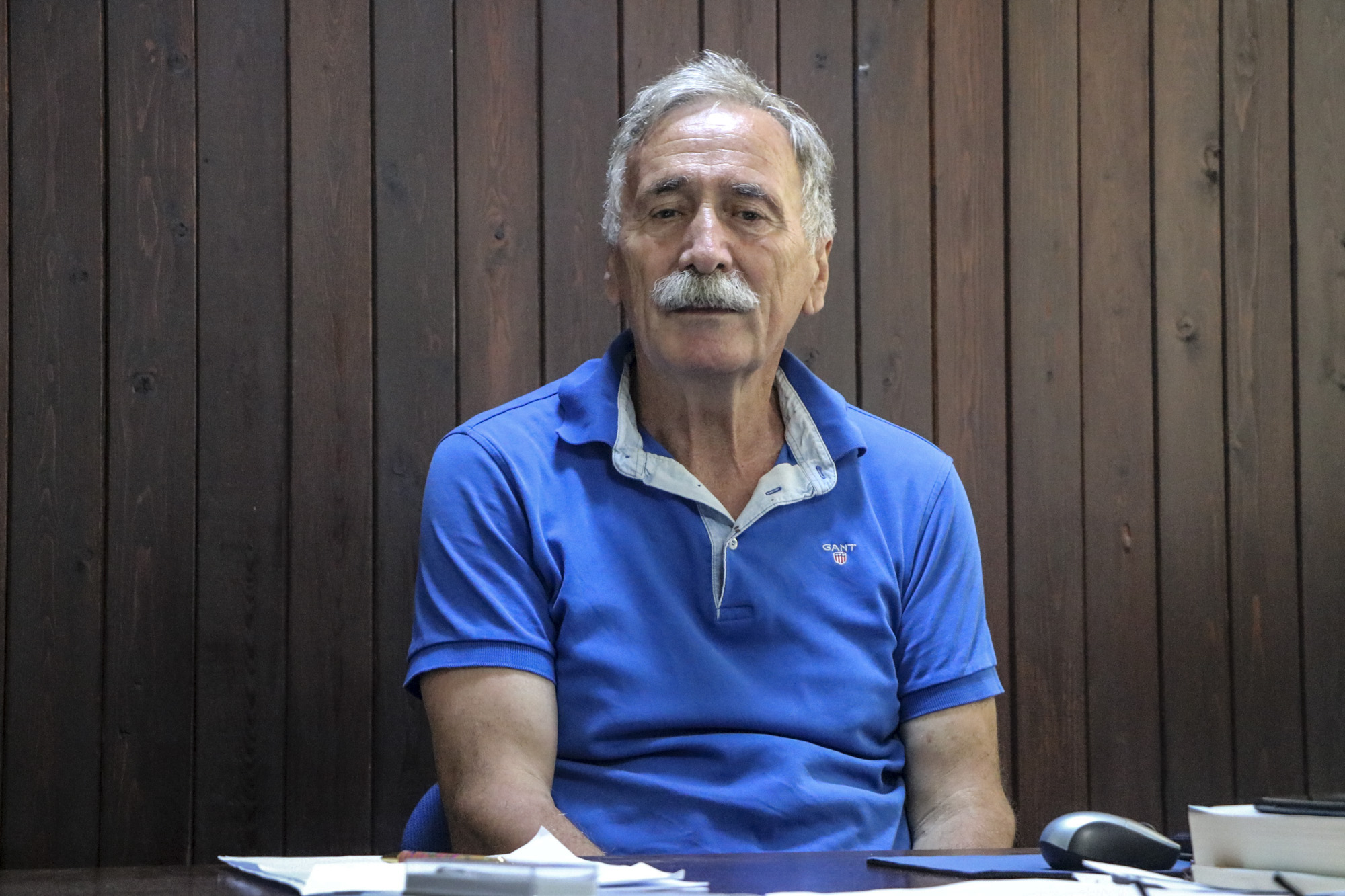
In the context of ongoing challenges posed by the increase in pensions in Kosovo, it is important to carefully examine the increase’s financial and social impacts. This debate highlights the tension between the necessary improvements in the pension and the challenges of translating them into national budget stability.
The head of the Association of Pensioners, Njazi Gashi, was in his forties in the 1990s. Since then, the pension system has changed so radically that he has trouble understanding it. “You don’t have to be a mathematician to do simple calculations,” said the 68-year-old. According to him, it is obvious that there is no real possibility to live decently on 100 euros a month.
“Your expenses increase the older you get as pensioners take a lot of medication,” said Gashi, adding that the average monthly cost for pensioners’ medications is between 30 and 35 euros. This means that out of 100 euros, 65 are left for other expenses. A burek and a yogurt costs 1.5 euros. If a pensioner eats one burek with a yogurt every day for a month, it costs 45 euros — almost half of the monthly pension.
“You cannot have dignity with 100 euros, when you can’t even have a one euro coffee with friends. We can’t talk about dignity anymore when you are not even close to it; you’re below zero, you’re being denigrated,” said Gashi.
Feature Image: Qëndresa Kastrati
This article is part of the Human Rightivism project, which is funded by the Embassy of Sweden in Prishtina, implemented by the Community Development Fund through its Human Rightivism Program. The author’s views expressed in this publication do not necessarily reflect the views of the Embassy of Sweden in Prishtina.
